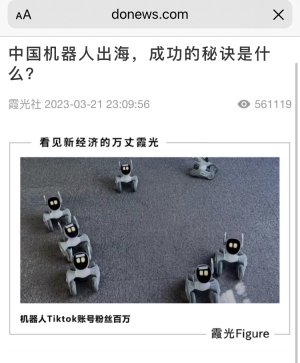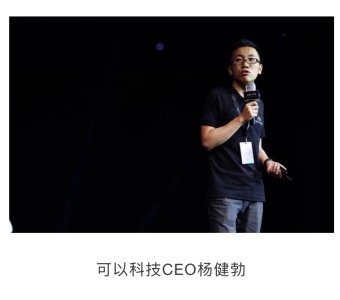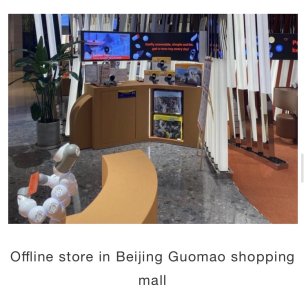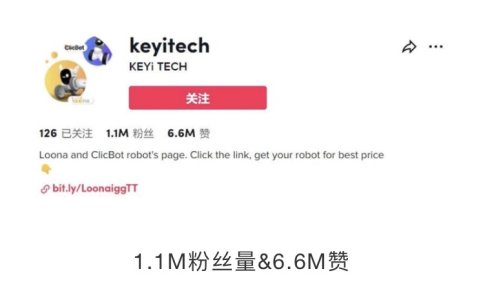An article about the business side of KEYi TECH that is full of detailed insights.
It’s a mammoth article, translated from Chinese Mandarin to English via Google translate.

Image source: KEYi TECH
What is the secret to the success of Chinese robots going to sea?
In today's increasingly close economic globalization, Chinese enterprises going overseas has become an irresistible trend of the times.
There are always leaders and trendsetters from all walks of life who keenly capture business opportunities, accurately predict future trends, accumulate and summarize effective strategies, and lead Chinese brands to resonate at the same frequency as the world's economic context.
For these sea-going explorers, Xiaguang Society launched the "Xiaguang Figure" series of planning , focusing on their overseas experience and industry experience, and sharing their trend insights and opportunity prospects.
This issue is the fourth in the series. Xiaguangshe talks to Can Technology CEO Yang Jianbo. He shares his experience and views in the field of new technology going overseas.
Author | Guo Zhaochuan
Editor | Song Han

Image source: KEYi TECH
Yang Jianbo's WeChat profile picture is a black and white stick figure of a full-body male: slightly short hair, square eyes on the bridge of the nose, and a plaid shirt that highlights the characteristics of an engineering man.
This portrait is very similar to a real sketch of his own image.
His brain is thinking quickly. It is obvious that Yang Jianbo, who can break the circle in the technological innovation track, is a leader of rational thinking.
"There are several kinds of difficulties encountered in going out to sea: one is that it doesn't work at all, and if you know it's not going to work, don't do it, and there is no difficulty; One is to do it well," Yang Jianbo said.
Seemingly very complicated and inexplicable problems, in Yang Jianbo's case, all turned into a minimalist diagnostic tool flow chart. Similarly, when a decision needs to be made, he often lists almost all options, tries and eliminates them one by one, and finally arrives at the correct answer in a very scientific way.
The biggest advantage of this flowchart-like way of thinking is that it is "not entangled". All plans and judgments can be carried out in an orderly direction.
As early as when he was studying at Beihang University, Yang Jianbo won the first prize of Beihang Fengru Cup by relying on the original version of the "deformable cell robot", and represented the school to participate in the Beijing Science and Technology Industry Expo that year. After accepting the award, he was still shy when speaking, but when he talked about his modular robot, his eyes were full of excitement.
Yang Jianbo registered "Beijing Can Technology" in 2014 when he was 23 years old.
In the school's laboratory, he and his classmates "kneaded" a brand-new robot in only 15 hours. This kind of robot iteration that pursued the limit fascinated him. Before graduating from university, his first finished robot "Cell Robot" was launched on the market. Immediately after its launch, he won the "Best of CES (Global Electronics Show Best Robot)" award from the BBC, and then won the Copenhagen Entrepreneurship Award Business Competition Champion.
In 2017, Yang Jianbo was selected as one of Forbes China 30U30 (30 under 30 China) and Forbes Asia 30U30 (30 under 30 Asia). Since then, he has also appeared on the news broadcast by relying on the R & D and production of the world's first educational modular robot, which "holds the core technology firmly in his own hands".
Can Technology CEO Yang Jianbo
After the launch of Loona, the latest generation of home consumer robot of Can Technology, Yang Jianbo started a new round of crowdfunding on the well-known overseas crowdfunding platform "Kickstarter".
ClicBot, another robot that was launched before, once received a crowdfunding amount of around US$1 million. As for the newly launched robot Loona, the original expected amount of overseas crowdfunding is 3 million US dollars.
This goal is very challenging. "Of course there is an element of gambling, but there are also data as a basis for judgment." Yang Jianbo said that he is very confident in his company's new products. "In fact, I have a certain understanding of the project, and I can deduce some from the previous conversion data."
In the end, the total amount of Loona crowdfunding exceeded 3 million US dollars, becoming the No. 1 crowdfunding list of consumer robots on Kickstarter.
In addition to the excellent results on overseas crowdfunding platforms, the Tiktok account that can be operated with technology has also gathered millions of foreign fans.
In a short video, a flexible companion robot puppy froze in front of a lit lighter, then quickly backed away and raised its left arm to express its rejection. Like a real puppy, the robot in the video nods in approval after fanning it to cool it off.
On Tiktok, such a short video has reached 8.6 million (8.6M) views—this is the popularity of Loona overseas.
As the Chinese R&D and designer of the robot puppy Loona, Yang Jianbo told Xiaguang News Agency, "The account operation can't be done on behalf of us, we do it ourselves, and most of the videos are shot in China (Beijing), and the number of views overseas It's not affected either."
In fact, Can Technology is headquartered in Haidian District, Beijing. Its first store in the world has opened in Beijing CBD International Trade Mall, and it has also opened offline stores in SKP, Lufthansa and other shopping malls. However, the main sales markets of its CellRobot, ClicBot, Loona and other intelligent robots are basically overseas.
Therefore, the operation of overseas social media such as overseas independent stations and TikTok is very important when going overseas.
Xiaguang Club had a dialogue with Yang Jianbo, CEO of Can Technology, on the topic of "new technology going overseas to North America" . He expressed his views and opinions on how to create new products overseas, overseas crowdfunding and marketing of new technology products, and how domestic robots go to the world.
About the sea market
Xiaguangshe: Why did you choose North America as the main market for launching robots? What are the main application scenarios for overseas users after purchasing robots?
Yang Jianbo: We are a consumer robotics company and have been developing robotics since 2014.
There are currently two main products: Libao and Loona. ClicBot has been developed since 2018 and will be launched in early 2020.
Loona is like a pet puppy who can only issue commands in English now. At the same time, it can also be used as a monitor to remotely check the situation at home. As a remote home monitoring, you open the APP, and you can check what the cats and dogs are doing and what the children are doing through the Loona camera.
The Klippo Mastermind can control the rotation of the sphere, control the action with contacts, and supply power to all modules through the Mastermind. Its current programming actions, some are official configurations, and some are the creativity of players. If you are interested, you can also create a brand new configuration, do a new program, and program it as you want it to move, with a high degree of freedom.
Our main overseas consumer groups are robot technology enthusiasts and teenagers.
These two robots are also sold in China, JD.com and Tmall are selling them, and we also have offline stores in China World Mall. But our current consumers are mainly in the North American market. In addition, our products are also selling well in the German and British markets, ranking second to North America.
Overseas application scenarios of the robot dog Loona
It’s a mammoth article, translated from Chinese Mandarin to English via Google translate.

Image source: KEYi TECH
What is the secret to the success of Chinese robots going to sea?
In today's increasingly close economic globalization, Chinese enterprises going overseas has become an irresistible trend of the times.
There are always leaders and trendsetters from all walks of life who keenly capture business opportunities, accurately predict future trends, accumulate and summarize effective strategies, and lead Chinese brands to resonate at the same frequency as the world's economic context.
For these sea-going explorers, Xiaguang Society launched the "Xiaguang Figure" series of planning , focusing on their overseas experience and industry experience, and sharing their trend insights and opportunity prospects.
This issue is the fourth in the series. Xiaguangshe talks to Can Technology CEO Yang Jianbo. He shares his experience and views in the field of new technology going overseas.
Author | Guo Zhaochuan
Editor | Song Han

Image source: KEYi TECH
Yang Jianbo's WeChat profile picture is a black and white stick figure of a full-body male: slightly short hair, square eyes on the bridge of the nose, and a plaid shirt that highlights the characteristics of an engineering man.
This portrait is very similar to a real sketch of his own image.
His brain is thinking quickly. It is obvious that Yang Jianbo, who can break the circle in the technological innovation track, is a leader of rational thinking.
"There are several kinds of difficulties encountered in going out to sea: one is that it doesn't work at all, and if you know it's not going to work, don't do it, and there is no difficulty; One is to do it well," Yang Jianbo said.
Seemingly very complicated and inexplicable problems, in Yang Jianbo's case, all turned into a minimalist diagnostic tool flow chart. Similarly, when a decision needs to be made, he often lists almost all options, tries and eliminates them one by one, and finally arrives at the correct answer in a very scientific way.
The biggest advantage of this flowchart-like way of thinking is that it is "not entangled". All plans and judgments can be carried out in an orderly direction.
As early as when he was studying at Beihang University, Yang Jianbo won the first prize of Beihang Fengru Cup by relying on the original version of the "deformable cell robot", and represented the school to participate in the Beijing Science and Technology Industry Expo that year. After accepting the award, he was still shy when speaking, but when he talked about his modular robot, his eyes were full of excitement.
Yang Jianbo registered "Beijing Can Technology" in 2014 when he was 23 years old.
In the school's laboratory, he and his classmates "kneaded" a brand-new robot in only 15 hours. This kind of robot iteration that pursued the limit fascinated him. Before graduating from university, his first finished robot "Cell Robot" was launched on the market. Immediately after its launch, he won the "Best of CES (Global Electronics Show Best Robot)" award from the BBC, and then won the Copenhagen Entrepreneurship Award Business Competition Champion.
In 2017, Yang Jianbo was selected as one of Forbes China 30U30 (30 under 30 China) and Forbes Asia 30U30 (30 under 30 Asia). Since then, he has also appeared on the news broadcast by relying on the R & D and production of the world's first educational modular robot, which "holds the core technology firmly in his own hands".
Can Technology CEO Yang Jianbo
After the launch of Loona, the latest generation of home consumer robot of Can Technology, Yang Jianbo started a new round of crowdfunding on the well-known overseas crowdfunding platform "Kickstarter".
ClicBot, another robot that was launched before, once received a crowdfunding amount of around US$1 million. As for the newly launched robot Loona, the original expected amount of overseas crowdfunding is 3 million US dollars.
This goal is very challenging. "Of course there is an element of gambling, but there are also data as a basis for judgment." Yang Jianbo said that he is very confident in his company's new products. "In fact, I have a certain understanding of the project, and I can deduce some from the previous conversion data."
In the end, the total amount of Loona crowdfunding exceeded 3 million US dollars, becoming the No. 1 crowdfunding list of consumer robots on Kickstarter.
In addition to the excellent results on overseas crowdfunding platforms, the Tiktok account that can be operated with technology has also gathered millions of foreign fans.
In a short video, a flexible companion robot puppy froze in front of a lit lighter, then quickly backed away and raised its left arm to express its rejection. Like a real puppy, the robot in the video nods in approval after fanning it to cool it off.
On Tiktok, such a short video has reached 8.6 million (8.6M) views—this is the popularity of Loona overseas.
As the Chinese R&D and designer of the robot puppy Loona, Yang Jianbo told Xiaguang News Agency, "The account operation can't be done on behalf of us, we do it ourselves, and most of the videos are shot in China (Beijing), and the number of views overseas It's not affected either."
In fact, Can Technology is headquartered in Haidian District, Beijing. Its first store in the world has opened in Beijing CBD International Trade Mall, and it has also opened offline stores in SKP, Lufthansa and other shopping malls. However, the main sales markets of its CellRobot, ClicBot, Loona and other intelligent robots are basically overseas.
Therefore, the operation of overseas social media such as overseas independent stations and TikTok is very important when going overseas.
Xiaguang Club had a dialogue with Yang Jianbo, CEO of Can Technology, on the topic of "new technology going overseas to North America" . He expressed his views and opinions on how to create new products overseas, overseas crowdfunding and marketing of new technology products, and how domestic robots go to the world.
About the sea market
Xiaguangshe: Why did you choose North America as the main market for launching robots? What are the main application scenarios for overseas users after purchasing robots?
Yang Jianbo: We are a consumer robotics company and have been developing robotics since 2014.
There are currently two main products: Libao and Loona. ClicBot has been developed since 2018 and will be launched in early 2020.
Loona is like a pet puppy who can only issue commands in English now. At the same time, it can also be used as a monitor to remotely check the situation at home. As a remote home monitoring, you open the APP, and you can check what the cats and dogs are doing and what the children are doing through the Loona camera.
The Klippo Mastermind can control the rotation of the sphere, control the action with contacts, and supply power to all modules through the Mastermind. Its current programming actions, some are official configurations, and some are the creativity of players. If you are interested, you can also create a brand new configuration, do a new program, and program it as you want it to move, with a high degree of freedom.
Our main overseas consumer groups are robot technology enthusiasts and teenagers.
These two robots are also sold in China, JD.com and Tmall are selling them, and we also have offline stores in China World Mall. But our current consumers are mainly in the North American market. In addition, our products are also selling well in the German and British markets, ranking second to North America.
Overseas application scenarios of the robot dog Loona


